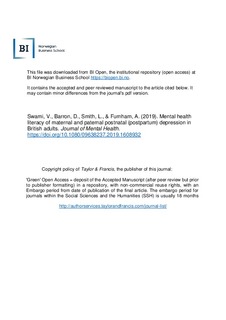| dc.contributor.author | Swami, Viren | |
| dc.contributor.author | Barron, David | |
| dc.contributor.author | Smith, Lee | |
| dc.contributor.author | Furnham, Adrian | |
| dc.date.accessioned | 2019-12-17T11:46:09Z | |
| dc.date.available | 2019-12-17T11:46:09Z | |
| dc.date.created | 2019-07-03T14:27:34Z | |
| dc.date.issued | 2019 | |
| dc.identifier.citation | Journal of Mental Health. 2019, 1-8. | nb_NO |
| dc.identifier.issn | 0963-8237 | |
| dc.identifier.uri | http://hdl.handle.net/11250/2633626 | |
| dc.description.abstract | Postnatal depression affects between 6 and 13% of new parents, but only a small proportion of individuals who meet diagnostic criteria receive optimal treatment. One reason for this is poor mental health literacy of postnatal depression. Studies have examined mental health literacy of maternal postnatal depression, but there are no similar studies of paternal postnatal depression, which we sought to rectify. A sample of 406 British adults was presented with vignettes describing cases of either maternal or paternal postnatal depression. Based on the vignettes, participants were asked to report if they thought anything was wrong with the targets and, if so, to describe what they thought was wrong. Participants also rated the targets on a range of attitudinal dimensions. Participants were more likely to indicate that something was wrong when the target was female (97.0%) compared to male (75.9%). Of those who believed something was wrong, 90.1% of participants correctly described the female target as experiencing postnatal depression, but only 46.3% did so for the male target. Participants also held more positive attitudes toward the female target than the male target. There is a gender binary in symptom recognition of postnatal depression, which highlights the need for greater awareness of paternal postnatal depression. | nb_NO |
| dc.language.iso | eng | nb_NO |
| dc.publisher | Taylor and Francis | nb_NO |
| dc.title | Mental health literacy of maternal and paternal postnatal (postpartum) depression in British adults | nb_NO |
| dc.type | Journal article | nb_NO |
| dc.type | Peer reviewed | nb_NO |
| dc.description.version | acceptedVersion | nb_NO |
| dc.rights.holder | Copyright policy of Taylor & Francis, the publisher of this journal: 'Green' Open Access = deposit of the Accepted Manuscript (after peer review but prior to publisher formatting) in a repository, with non-commercial reuse rights, with an Embargo period from date of publication of the final article. The embargo period for journals within the Social Sciences and the Humanities (SSH) is usually 18 months | nb_NO |
| dc.source.pagenumber | 1-8 | nb_NO |
| dc.source.journal | Journal of Mental Health | nb_NO |
| dc.identifier.doi | 10.1080/09638237.2019.1608932 | |
| dc.identifier.cristin | 1709838 | |
| cristin.unitcode | 158,4,0,0 | |
| cristin.unitname | Institutt for ledelse og organisasjon | |
| cristin.ispublished | true | |
| cristin.fulltext | postprint | |
| cristin.qualitycode | 1 | |
